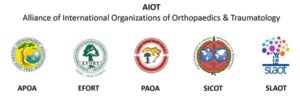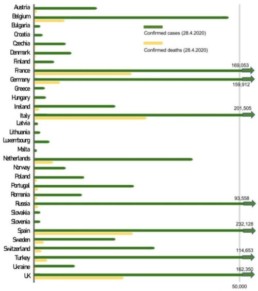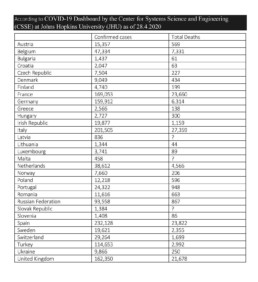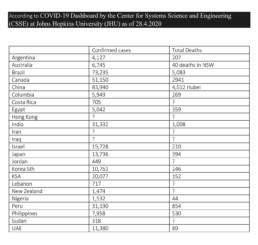 EHS Secretary General, Professor Eleftherios Tsiridis
EHS Secretary General, Professor Eleftherios Tsiridis
This webpage is dedicated to Covid-19’s effects on hip surgery in EHS member countries and will link to international literature on the pandemic to help our members keep abreast of the virus in our community. Please email the EHS Secretariat Office (samstokesehs@gmail.com) with articles you have published about Covid-19 and would like us to feature here. There will be 4 main sections:-
1) Papers written by EHS members on Covid-19
2) Presentations by Nat Reps and Ambassadors about Covid-19 in their countries
3) Selection of papers from international literature on Covid-19 and orthopaedics
4) Infection update of EHS member countries from the JHU reseource centre
We look forward to receiving your contributions.
EHS & EKA Online Survey results: Disruption of Joint Arthroplasty Services in Europe during the COVID -19 Pandemic

by EHS Treasurer Martin Thaler (pictured), EHS President Jean Alain Epinette & EHS SciCom Chairman Luigi Zagra
Accepted in KSSTA: DOI: 10.1007/s00167-020-06033-1 KSST-D-20-00583R1
The EHS in cooperation with the EKA performed an online survey to measure the disruption of joint arthroplasty (TJA) services in Europe during the COVID -19 pandemic. The survey was conducted in the European Hip Society (EHS) and the European Knee Associates (EKA). The survey consisted of 20 questions dealing with the impact of the pandemic on arthroplasty surgeons and their daily work.
272 arthroplasty surgeons (217 EHS, 55 EKA) from 40 different countries participated. Of the respondents 25.7% stated that all surgeries were cancelled in their departments, while 68.4% responded that elective inpatient procedures were no longer being performed. With regard to the specific surgical procedures, nearly all primary TJA were cancelled (92.6%) as well as aseptic revisions (94.7%). In most hospitals periprosthetic fractures (87.2%), hip arthroplasty for femoral neck fractures and septic revisions for acute infections (75.8%) were still being performed.
We found that during the current 2020 COVID-19 pandemic we are experiencing a near-total shutdown of TJA. A massive cutback was observed for primary TJA and revision TJA, even in massively failed TJA with collapse, dislocation, component failure or imminent dislocation. Only life-threatening pathologies like periprosthetic fractures and acute septic TJA are currently undergoing surgical treatment. This was the situation in the middle of April. Hence, nobody can definitely predict further development of the disease the EHS and EKA (approved by our President) decided to perform a similar survey in the next days, in order to further evaluate all impairments on our daily work. We kindly would ask all members of the EHS again to participate in the upcoming survey and to help us to document this desperate situation for patients and surgeons.
Results show that over 90% of us have stopped primary hip and knee replacements in Europe – a fact we are all well aware of. Here two articles published on LinkedIn in collaboration with EHS on this survey:-
Why Surgeons don’t want to operate right now
 We present an article published in The Bloomberg, where Prof Alister Hart (pictured; Chair of Orthopaedics at UCL and EHS EduCom member), teams up with EHS member Prof Francesco Benazzo, a professor of orthopaedics in Lombardy, to understand the impact of Covid-19 in a surgical setting.
We present an article published in The Bloomberg, where Prof Alister Hart (pictured; Chair of Orthopaedics at UCL and EHS EduCom member), teams up with EHS member Prof Francesco Benazzo, a professor of orthopaedics in Lombardy, to understand the impact of Covid-19 in a surgical setting.
“Though blood and gore may not be its favored route, research into airborne transmission (such as SARS and MERS) supports the idea that Covid-19 is an opportunistic invader,” says Prof Hart, as he discusses PPE for hip surgeons: “the right model here is the protocol that was adopted for HIV: All patients, unless proven otherwise, are assumed to have it and surgeons take the appropriate precautions.”
COVID‑19 coronavirus: recommended personal protective equipment for the orthopaedic and trauma surgeon
Also from Prof Hart, an abstract with other authors was published by Springer in Knee Surgery, Sports Traumatology, Arthroscopy this April. He takes into account the “potentially infective aerosol” that can be generated during orthopaedic and trauma procedures.
EFORT brings us Key Recommendations of Covid-19 Best Practices

- General considerations
- Outpatient care and elective procedures
- Urgent/emergent procedures and risk mitigation strategies
- Consolidation of 83 published recommendations
Click here for the pdf or to go to the LinkedIn site




